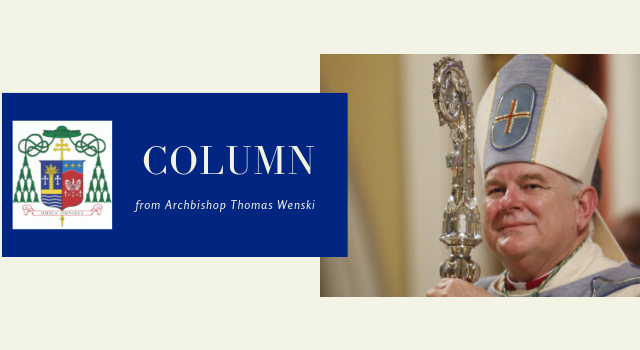By Archbishop Thomas Wenski - The Archdiocese of Miami
March 8, at the beginning of our state’s legislative session, Catholics representing all seven dioceses of Florida traveled to Tallahassee, our state’s capital, for Catholic Days at the Capitol. Coordinated by the Florida Catholic Conference, these men and women spent a full day of “lobbying” state senators and legislators (or their staffs) on a variety of issues of concern to the Church in Florida.
Afterwards, they joined me and the other bishops of Florida in a concelebrated “Red Mass” at St. Thomas More Co-Cathedral invoking the Holy Spirit’s assistance on behalf of the executive, legislative and judicial branches of our state government. Most elected officials are grateful for the prayers although they do not always agree with our positions or we with theirs. And many do attend the Mass each year.
During our Catholic Days, we advocated for greater protection for the unborn, for the rights of parents to be involved in the education of their children and their right to choose Catholic schools and avail themselves of tuition scholarship assistance. We advocated for the end of capital punishment and opposed efforts to rescind the requirement of a unanimous jury in order to impose a death sentence. We questioned the expansion of payday loans that often become “poverty traps” because of usurious interest rates. We applauded efforts to expand affordable housing, and we supported conservation efforts to protect the environment and to restore the Everglades, so necessary for future generations in South Florida.
We also raised serious concerns over proposals that would criminalize “empathy” with draconian legislation aimed at irregular migrants. If this legislation passes as proposed, our family, friends and neighbors will run the risk of being charged with a felony for going about their daily lives, such as transporting a neighborhood child to soccer practice or an attorney giving their client a ride to immigration court. These proposed bills would turn Florida, promoted by some as the “freest state,” into a surveillance state and ultimately harm all Floridians by eroding public safety, increasing racial profiling and shattering public trust in our communities.
Some may question why the Church concerns herself with such “mundane” issues. After all, isn’t our mission to help people get to heaven? Certainly, but a rich body of Church teaching, including papal encyclicals, bishops’ statements and pastoral letters, has consistently reinforced our moral obligation to treat “the least of his brethren” as we would treat Christ himself.
Our mission is to help everyone but especially the “least, the last and the lost” to get to heaven. But the “highway” to heaven is this life. And as Church we must be concerned about the conditions along this highway – lest obstacles, potholes, or other dangers (poverty, war, unjust discrimination, etc.) could cause us or our fellow man to run off the road and break down before reaching our heavenly destination. So, to help people get to heaven, we must seek to promote justice and conditions that would favor human flourishing.
At Catholic Days, we urged our elected officials to resist that reductive reasoning that would reduce a human being, into a “problem.” The successive genocides of the 20th century were the result of such reductive thinking. To think of a human being as a “problem” offends the dignity of the human person made in the image and likeness of God, and so, no man or woman should be reduced to being a “problem.”
The unborn child is not a problem – but a baby that should be protected by law and welcomed in life; the frail elderly or special needs child, not a problem but recognized as someone who can love and be loved; even the criminal, despite the horror of his crime, remains a human being (and so he must be treated with dignity even in his punishment, and this is also why we work to end capital punishment). And while our broken immigration system is problematic, the migrants themselves are not “problems”; “strangers” perhaps but “strangers” to be embraced as brothers and sisters.
As the Fathers of the Second Vatican Council wrote in Gaudium et Spes: “The joys and the hopes, the griefs and the anxieties of the men of this age, especially those who are poor or in any way afflicted, these are the joys and hopes, the griefs and anxieties of the followers of Christ. Indeed, nothing genuinely human fails to raise an echo in their hearts.”

